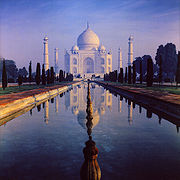- Anasheed
-

Part of a series on
Islamic culture
Architecture Arabic · Azeri
Indo-Islamic · Iwan
Moorish · Moroccan · Mughal
Ottoman · Persian · Somali
Sudano-Sahelian · TatarArt Calligraphy · Miniature · Rugs
Dress Abaya · Agal · Boubou
Burqa · Chador · Jellabiya
Niqab · Salwar kameez · Taqiya
kufiya · Thawb · Jilbāb · HijabHolidays Ashura · Arba'een · al-Ghadeer
Chaand Raat · al-Fitr · al-Adha
Imamat Day · al-Kadhim
New Year · Isra and Mi'raj
al-Qadr · Mawlid · Ramadan
Mugam · Mid-Sha'ban
al-TaiyyabLiterature Arabic · Azeri · Bengali
Indonesian · Javanese · Kashmiri
Kurdish · Persian · Punjabi · Sindhi
Somali · South Asian · Turkish · UrduAnasheed (Arabic: singular نشيد Nasheed, plural أناشيد Anaasheed; also spelt Nasyid in Malaysia and Indonesia; ilahi in Turkish; Naat in Pakistan), is Islamic vocal music that is either sung a cappella or accompanied by percussion instruments such as the daff. In general, true Islamic anasheed does not contain lamellaphone instruments, string instruments, or wind and brass instruments, although digital remastering—either to mimic percussion instruments or create overtones—is permitted. This is because many Muslim scholars interpret Islam as prohibiting the use of musical instruments except for some basic percussion.
Anasheeds are popular throughout the Islamic world. The material and lyrics of anasheed usually make reference to Islamic beliefs, history, and religion, as well as current events.
The use of musical instruments is implicitly prohibited in the Ahadith. The founders of all four of the major madhabs—schools of thought in Islam—as well as many other prominent scholars, have debated the legitimacy and use of musical instruments. One such example of the scholars' opinions is of the famous Muslim scholar, Abu Hanifa, according to whose madhab, the Hanafi madhab, if a person is known to listen to such forbidden musical instruments, their testimony is not to be accepted. Another Islamic scholar, Ibn Taymiyyah, once said that music is like alcohol to the soul.[1] Almost all Muslim scholars traditionally have held that music with all its instruments are Haraam: forbidden by the hadith, as well as by tradition.[citation needed] The only instrument commonly allowed is the duff, which is a small hand drum, similar in size to a tambourine, but lacking bells.[citation needed]
Contents
Prohibition in the Qur’an
It is stated in the Qur'an that
And of mankind is he who purchases Laghwal Hadith to mislead (men) from the Path of Allâh without knowledge, and takes it (Verses of the Qur'ân) by way of mockery. For such there will be a humiliating torment (in the Hell-fire).[2]
Some of the closest companions of Muhammad, namely Abdullah ibn Abbas and Abdullah ibn Mas'ud, state in their Tafsirs (commentaries on the Qur’an) that “Laghwal Hadith” mentioned in the above verse of Qur’an “.. is singing”.[citation needed] In particular, it is reported that Abd Allah ibn Mas'ud used to "swear by Allah and say that idle talk is singing."[3]
In addition to this basic evidence, both Sunni and Shi'ite scholars cite several other passages from the Qu'ran as evidence for the prohibition of musical instruments.[citation needed]
Prohibition in the Hadith
According to the authentic collection of Sunni Islam, Muhammad said that musical instruments are sinful:
“Narrated Abu 'Amir or Abu Malik Al-Ash'ari (a companion of Muhammad) that he heard the Prophet saying, "From among my followers there will be some people who will consider illegal sexual intercourse, the wearing of silk, the drinking of alcoholic drinks and the use of musical instruments, as lawful…”[4]
Prohibition in Islamic tradition
Apart from the evidence that Sunni scholars draw out from the Qur’an and Hadith, many Islamic scholars throughout Muslim history have agreed that every type of music and musical instruments is Haraam. These scholars include the four imams, namely Imam Abu Hanifa, Imam Malik, Imam Shafi'i and Imam Ahmad ibn Hanbal.[5]
However, this remains thoughts of some. While most think singing is not prohibited by Islam, the matter of musical instruments remains an argument.Modern interpretations
A new generation of nasheed artists use a wide variety of musical instruments in their art. A lot of new nasheed artist are non-Arabs and sing in different languages, like English or Turkish. Some of the nasheed bands are Native Deen, Outlandish and Raihan. Other well known foreign artists are Yusuf Islam -formerly known as Cat Stevens -, Sami Yusuf, Maher Zain, Mesut Kurtis, Dawud Wharnsby, Zain Bhikha and many others. As for Arabic nasheed artists -or Munshids-, some of the well known are Abu Mazen, Abu Rateb, Abu Al joud, Abu Dujanah, Abdulfattah Owainat, and many others. Some of the well known Arabic nasheed bands are Al Rawabi, Al I'atisam, Al Baraa', Al Wa'ad and many others.
Appealing to a significant Muslim crowd and also leading to performance of such artists at Islamic orientated festivals (such as Milad), conferences, concerts and shows, including ISNA, Celebrate Eid, and Young Muslims. Other artists and organisations such as Nasheedbay promote an instrument-free stance with nasheeds, differing from the current trends of the increasing usage of instruments in nasheeds.
See also
References
- ^ AhmadJibril.com (Archived version
- ^ Qur'an, Chapter 31(Lugman): Verse 6.
- ^ "Muslim Creed." The Daar of Islamic Heritage. 2008-01-03. Retrieved on 2008-09-25. Archived 2009-10-25.
- ^ Shahih al-Bukhari Volume 7, Book 69, Number 494v: English translation of this hadith here.
- ^ Sheikh Muhammed Salih Al-Munajjid. "Ruling on so-called “Islamic” songs with musical instruments. Islam Question & Answer. Retrieved on 2008-09-25.
External links
Categories:- Islamic media
- Islamic music
- Singing
- Pakistani music
Wikimedia Foundation. 2010.
